 Original drawings by Trevor Pacelli Original drawings by Trevor Pacelli -by Trevor Pacelli The world of Pokémon has long been a favorite of both kids and adults on the autism spectrum, like me. I joined the Pokémon fandom at ten years old, my first game being Pokémon Ruby on the Gameboy Advance SP. Although I drifted away from the games once I hit adulthood, I still couldn’t help but keep up with the franchise. Eventually, I felt the urge to play the games again. In 2021, I bought a Nintendo Switch, and became the proud owner of four games: Pokémon Brilliant Diamond, Pokémon Legends Arceus, Pokémon Shield, and Pokémon Scarlet. While I admit the games’ quality is lackluster, and there are problems with disability friendliness, the chill environments of these Pokémon worlds with the diverse 1,000+ Pokémon delight me as much as when I was twelve. But unlike back then, I got sucked into a component of Pokémon that in turn sucked out what originally drew me to the franchise: competitive battles. Yes, a whole subculture of Pokémon fans is all about competitive battles. I tried entering the scene for something "fun" to do and quickly found I could not do so using my favorite Pokémon. I did a lot of research on how to build the right team and build them in-game (which always took forever). I spent every day on an online battle simulator (Showdown!) to test out teams I made, learning through trial and error why my strategies weren’t working. Whenever I thought I found a good team, losing enough times made me realize the team's blind spots, requiring building a new team from scratch. I was thrown into many gamer-rage fits from the constant losses, which affected my general happiness throughout the day. In addition, the sweat, blood, and tears shed from my practice never helped me win. But for quite a while, I thought I was improving. So, I took a three-day trip to Portland for a Pokémon video game championship. I wasn’t comfortable enough to be in the official tournament, but I went as a spectator who partook in battles on the side. The trip started off with a minor car accident that caused quite a bit of stress for me, and it didn’t get much better from there. On day one at the Portland Convention Center, I did only one battle, which I lost easily. On day two, the official competitive battles I could watch were few and far between, with most of my time spent waiting until the next battle to either watch or partake in. I had one win, but then four straight hard losses. By that final loss, I had had enough. I didn’t go back to the convention center, but did some tourist things around Portland that evening and the next day before going home. So, overall, my tournament experience was much less than I had hoped for. Portland set the first ripple of an important lesson I had to learn: Sometimes, you must accept that no matter how hard you practice, you will never be good at a certain hobby. That’s exactly what I’m finding with my incapacity to stand a chance against other players. Even if I think I know the strategy of whomever I’m playing against, he throws a curveball at me, and I don’t have the mental processing speed to readjust my plan under pressure. So, I have learned that it’s best to give up on Pokémon battles and stick to the hobbies I enjoy and others have told me I’m good at, like cooking, photography, story writing, and drawing. The last of these is why I became a Pokémon fan in the first place. Because I love the fun Pokémon designs, it inspired me to draw my own Pokémon creations over the years, which can be seen on my Instagram page, @Murro_Region. This is something I believe I should stick with since it gives me a sense of self-accomplishment. This isn’t the first time I gave up a hobby. Here’s my blog post about when I decided to stop writing weekly movie reviews. To decide whether it’s time for you to give up a hobby, ask yourself:
Trevor Pacelli is an adult author and illustrator on the autism spectrum. Trevor’s Books | Trevor’s Instagram @Murro_Region
0 Comments
 By Trevor Pacelli After college, I found myself waiting for travel opportunities to come to me. I didn’t want to face the awkward loneliness of traveling alone and I believed traveling with a wife or in some group were my only options. I even did a mission trip to Spain five years ago, but I was put into stressful social situations, and the fact that I couldn’t connect well with my team made me feel even lonelier than being there by myself. Then when I adopted a dog three years ago, I was motivated to travel to the ocean for an overnight trip with her. It was the first time I booked a hotel room on my own, and had a great time. After that, I went on two separate overnight trips to Portland, which got me more comfortable with traveling on my own. But I still hadn’t gone on a big solo vacation that required an airplane. I had been feeling a strong urge to return to Disneyland, since I hadn’t been there since 2008, and it reached a point where I finally said: “That’s it. Time for a Disney vacation. With or without somebody else to do it with me.” So, for the next several months, I did a lot of planning on what to expect. My mom gave me a Disneyland vacation guide on Christmas. I booked a hotel room, I made reservations for Disneyland and California Adventure, and two months before my visit, I made restaurant reservations. I looked up which park attractions would have the longest wait times. I researched the most critically acclaimed food items and planned my meal and snack times around them. My sister also gave me some advice, since she had made the trip recently. As a result of all I did before the vacation, I can proudly say that my Disneyland 2024 trip turned out to be monumental, even life-changing. I truly had the time of my life. Surprisingly, I never felt lonely the entire time, not even at sit-down restaurants on my own. I spent three full days in the parks, pretty much from opening to closing, which might not be possible with other travelers. The attraction highlights for me were the Indiana Jones Adventure, Pirates of the Caribbean, the Adventureland Treehouse, Mickey’s Runaway Railway, Rise of the Resistance, Radiator Springs Racers, Toy Story Midway Mania, Web Slingers: A Spider-Man Adventure, Soarin’ Around the World, the Incredicoaster, Grizzly River Run, and the Mad Tea Party (which I found is best to go on at night). It was perfectly fine riding by myself, and sometimes an advantage, since a few of these rides had single-rider lanes. I even found a strong appreciation for the gentler thrill rides like Astro Orbitor and Golden Zephyr, which allowed me to be in the air and feel the relaxing breeze through my body as I took in grand views of the park. It was nice to take my time through any rides I wanted to try. This trip was also my first time seeing Galaxy’s Edge, which is so detailed and perfect for any Star Wars fan, like me. Cars Land was amazing to see as well, it was just so immersive and beautiful to be in at night. The only slight sadness I felt was finding the Haunted Mansion was closed for refurbishment, and Splash Mountain was still in the process of being renovated into Tiana’s Bayou Adventure. I love good food, and the best thing I ate was the Monte Cristo at Café Orleans. I also loved the raspberry rose macaron at Jolly Holiday Bakery, the bacon at Carnation Café, the chocolate peanut butter sandwich, and of course, those famous pineapple Dole whips! Although I was excited about it, deciding on what food to get was the most disorienting part of my trip. It was a challenge to figure out the best of the best in both parks and make sure to get my money’s worth, and some of the places weren’t always open. The pineapple Dole whip, for instance, I couldn’t get on my last day at Disneyland because of closures, but ended up finding one at the Disneyland Hotel before flying home! And of course, as a lover of visual arts, I have to mention the World of Color, the water and light show at California Adventure that plays at night outside Pixar Pier. It’s one thing to hear about it and watch a video of it, it’s a whole different thing to see it in person. Watching the showcase of lights, music, and water put into perspective why the Disney brand remains so relevant even after a hundred years. It’s a corporation full of passionate artists who pour their whole souls into pushing the mediums of animation and visual effects forward, innovating new storytelling techniques that enable anyone the chance to tell their own stories. I’ve come back from Disneyland a changed man, and now instead of waiting for someone else to do trips with me, I’ll always have a major vacation I’m looking forward to year after year. The question is, where will I go in 2025? I’m thinking New Orleans. Thus, I believe planning a vacation can be one of the most important accomplishments an autistic adult could ever achieve. Not only is traveling alone so much cheaper than traveling in a group, but it’s a benefit to not have to plan each day around anyone else. I’ve been on family vacations where stressing over what to do next and working around hiccups in the trip can take the fun out of it. Yet when I was in California by myself, stress was never a problem! It was easy for me to readjust to plan B whenever necessary (partly also because of my extensive research). So, planning a solo vacation is a fantastic goal for other adults on the autism spectrum to set for themselves, it’s an enormous step forward in independence and is perfect for rediscovering your potential. Trevor's latest books are What the Movies Can Teach Us About Bullying, and What Movies Can Teach Us About Disabilities. Meet him at Indie Author Night at Brick & Mortar Books in Redmond, Washington on June 3 from 6 to 8 p.m.  Trevor Pacelli talks about how his traits of being direct and honest have allowed him to have an impact on others in mentoring and other roles. From Seattle Children's Hospital Autism Blog, Being autistic, I have always been a very blunt person. Back when I was a kid, I often blurted out straightforward, even disrespectful comments when meeting others, . . . Read More  Similar to others my age, I watched Avatar: The Last Airbender on Nickelodeon as a kid. While I did enjoy the show, it wasn’t necessarily one of my favorite things to watch, not like SpongeBob SquarePants. Yet once I revisited the series on Netflix years later, I saw it with a new perspective I didn’t have when I was twelve. As a person with autism, I have come to greatly appreciate the cartoon world’s religion, politics, cultural differences, architecture, and philosophies in depths unheard of in entertainment for kids, or even for adults. I can now see how the show’s character with a disability parallels me and maybe others. Most shows for grownup audiences wouldn’t be mature enough to create an empowering character with a disability while also showing their weaknesses. In Avatar, Toph Beifong is a blind twelve-year-old girl who claims to be the world’s most powerful earthbender. She uses her bending abilities to feel the earth through her bare feet, which compensates for her disability by giving her a mental map through seismic vibrations of where everything is around her. As the series progresses, her earthbending only gets stronger, and she even invents metalbending by detecting the earth particles inside metal components, something no other earthbender could ever do. Since she grew up with parents who only saw her as weak and helpless because of her disability, they sheltered her from the world. They never allowed her to leave their house, so to get any semblance of the life she always needed, she had to secretly escape her parents. Because of her upbringing, Toph is fiercely determined to prove how capable she is. That means she refuses any help, and soon after joining the Avatar’s team, she intends to only look after herself without helping the others with various tasks like setting up camp. She believes that if she relies on anyone else or does anything to make herself look reliant on others, it makes her weak. It’s not until she has a talk over tea with the wise Uncle Iroh that she understands how needing one another is a basic human necessity. The rest of the series validates this point, as Toph is vulnerable in many locations because of her blindness. In the desert, the instability of the sand makes it difficult for her to form a mental map of her surroundings through her feet. She needs to cling to someone’s arm when at sea or riding on the Avatar’s flying bison, Appa--places she can’t feel the earth through her feet. In addition, because she’s blind, she can’t read, so people have to read things out loud to her. As an autistic person, I often feel similar struggles when others think little of me. I believe I must prove that I'm not just a dumb kid with a developmental disorder and that I can do whatever others without autism can do. So, if somebody asks me if I need help with something, or if I know what a certain word or phrase means, I get offended, because they wouldn’t ask that same question to someone without autism. However, there are some things I simply do need help with, more than most others my age. For example, my parents had to help me with securing a place to live and finding a job. Factors like home size, cost, location and renovations overwhelm me, and never really cross my mind. Even when I’ve moved in, I don’t ever think about making any kind of changes. I’m a simplistic take-it-or-leave-it kind of guy. I would certainly be lost if I didn’t have my parents guiding me through living on my own or getting a job. I’d probably be homeless by now. Likewise, plenty of others with mental or physical disabilities need extra help with certain tasks that those without disabilities don’t need help with. It sounds discouraging to know that at the age of thirty, some people will still be reliant on their parents. They may have to watch their peers and siblings enjoy far more freedom from mom and dad than they’ll ever get. Unfortunately, that’s just how things need to be at times. Some with disabilities are simply going to need this type of extra assistance their entire lives, just like Toph with her blindness. However, just like in Toph’s case, that dependency on others doesn’t make you weak, it just makes you human. Toph is mentioned in my book, What Movies Can Teach Us About Disabilities, as an example of strong disability representation I was exposed to as a kid, one that I at the time had taken for granted. I have also recently written the book, What Movies Can Teach Us About Bullying. 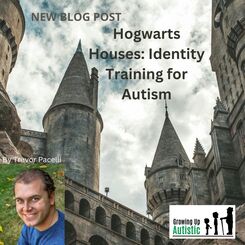 Photo by cant on Unsplash Photo by cant on Unsplash Like other twenty- and thirty-somethings, I grew up watching the Harry Potter series. Every kid around my age was all over the books and movies from grade school through high school. The first movie premiered when I was in third grade, and the last one premiered the summer after I graduated from high school. Each of these eight films was a massive theatrical event, so the series heavily influenced the childhoods of my generation. I believe one of the key reasons the books and movies have been so influential is the way author J.K. Rowling defines the characters, all of which are broken up into four houses at Hogwarts’ School of Witchcraft and Wizardry: Gryffindor, where brave students are sorted into. Hufflepuff, where loyal students are sorted into. Ravenclaw, where intelligent students are sorted into. Slytherin, where power-hungry students are sorted into. In Harry Potter’s first year at Hogwarts, the sorting hat is put on his head, and it struggles to decide where exactly he would be best suited. Although he requests Gryffindor, it’s later revealed that Harry, having almost been killed by the evil Lord Voldemort (a Slytherin) as a baby, still has a piece of Voldemort’s soul inside his body. Thus, Harry would be a better fit for Slytherin. Yet that doesn’t mean he’s not courageous, because he never hesitates to stand up for what he knows is right, even if it means going face-to-face with death more than once. Harry’s not the only one who has personal traits of more than one Hogwarts house. Ron Weasley is a Gryffindor, but also has immense loyalty to his family, like a Hufflepuff. Hermione Granger is a Gryffindor, but also has an encyclopedic knowledge of spells, like a Ravenclaw. Draco Malfoy is a Slytherin, but also isn’t afraid to put his safety in danger to get his way, like a Gryffindor. There are many online quizzes you can take that tell you which Hogwarts house you would best fit into. But playing this game for you or a friend doesn’t have to be done by a questionnaire. You could simply observe someone and take note of their actions and personality. That brings me to my main point: Fantasy worlds and special interests can help those on the autism spectrum. Here’s what I mean. Most people in a casual setting can pretty easily know the unspoken signs of another’s personality by watching them. They don’t need the personality traits spelled out for them—reading the room is second nature. People with autism don’t usually have that. They can’t tell what another person’s intentions or thoughts are simply by watching them; they need to be told directly if someone is being disrespectful or manipulative. Someone on the autism spectrum might not relate to other people very well, but they can relate to their special interest extraordinarily well. This can include any fictional fantasy world with a fanbase, such as Star Wars, Pokémon, The Lord of the Rings, or Harry Potter. The latter of these examples can help with the use of the four Hogwarts houses. Somebody with autism could take on the task of figuring out which Hogwarts house they think a friend or family member would best belong in. It could turn into a fun game of detective work where the person with autism has to carefully think about the other person to decide whether they have more traits of a Gryffindor, Hufflepuff, Ravenclaw, or Slytherin. This in turn could encourage social interaction between that autistic person and the one they’re trying to place in a house. While using others for your own game could sound questionable, it may be the best motivation for autistic people to think more about what others are like. I suffer from anxiety, so I’m not a Gryffindor. I couldn’t manipulate people even if I tried, and I’m relatively content with where I am in life, so I’m not a Slytherin either. However, I do have hints of Hufflepuff because I’ve proven myself to be a hard and loyal worker. Yet because I’m dependent on my creative mind in work and in hobbies, I’m the best fit for Ravenclaw. In thinking of others, I know a church pastor who has been immensely courageous amidst the challenges he’s faced, and while he has book smarts, he’s mostly motivated by community-building and his family. Thus, he seems to be the best fit for Hufflepuff. That’s just an example of how using something an autistic person is already interested in can help develop an interest and understanding in people. But full disclaimer: This is no means to an end in getting to know people. It’s unhealthy to get overly caught up in your fantasy, especially when trying to force others into your own imagination. The exercise I described can be a great motivator, but deciding whether a friend or family member would be best for Gryffindor or Slytherin is not a permanent solution to overcoming personality blindness. When learning about one another, nothing can replace simple conversation. While there can be ways to get there based on the individual’s current strengths, human interaction with one another should always be the end goal. Trevor Pacelli is the author of Six-Word Lessons on Growing Up Autistic, What Movies Can Teach Us About Disabilities and other books on Amazon.  By Trevor Pacelli 2023 is ending, so I figured now would be a good time to share some of my upcoming projects for 2024, as well as how working on these projects has given me multiple opportunities to be a storyteller. Read the full post 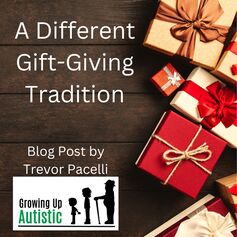 By Trevor Pacelli Gift-giving at Christmas time can be difficult for anyone, but even more so for someone on the autism spectrum such as myself. Throughout my childhood and most of my adulthood, my family gave each other Christmas gifts the same way most everyone else does, by giving each family member a present we picked ourselves. That meant every year, I got one gift from Mom, one from Dad, and one from my sister. In turn I gave a gift to each of them. I also got a gift from my grandparents, and when my sister got married, her husband was included in the gift-giving. This system worked out fine throughout my childhood, as we got the whole routine done in about twenty minutes, and my sister and I just spent the rest of Christmas day playing with our gifts and watching A Christmas Story on TBS. But things changed as we got older. Nowadays, my family and I are all the type of people who already feel content with what we currently own; whenever we want/need something, we just buy it ourselves instead of waiting for someone else to do it for us. So, when it came to putting together Christmas wish lists, thinking of what to put on our lists became more and more stressful for all of us, and having to stick to the lists just took out the personal feeling behind a present. I’ve tried in the past to deviate from the wish lists I’ve received from family members, and that only resulted in hurt feelings. Furthermore, it was a symptom of an even bigger problem of mine, my inability to truly understand others. Because I never had much common sense in assessing the personal interests of others, I never knew exactly what someone would want in a present. To add to the damage, I was expected to just know all these many unspoken rules of gift exchanges, such as following a price limit so that it’s not too expensive or too cheap. The gift-giving exchange was much easier for me as a kid, because I could get excited for whatever toys I’d be getting, and I wasn’t expected to select meaningful gifts for my other family members (or my mom would just help me find the right gifts). But once I became an adult and was suddenly expected to put some actual thought into my gifts, the holiday officially started to feel like work rather than a joy. The rest of my family were feeling similar emotions, so in 2019, we shook things up. Rather than gifts, we gave each other cookies. I made four different sweet treats for each family member: one for Mom, one for Dad, one for my sister, and one for my brother-in-law. I also got cookies from them in exchange. Although I’ll admit my treats didn’t turn out perfectly, we were still satisfied with doing Christmas this way, and we’ve kept this tradition ever since. We have kept a scaled-down version of traditional gift-giving. We put our names on separate pieces of paper, each drawing a name, and that’s who we give a gift to, one that’s between $20-$30. We did this before starting our new cookie tradition, except before the gifts were stored in our stockings. But now we just traditionally wrap these gifts instead of using the stockings. (In fact, stockings have now become so irrelevant to our Christmases that my Mom did not even bother putting them up on the mantlepiece this year.) Since making this switch, we no longer write out Christmas wish lists or feel pressured to give everyone the right gift. And thus, Christmas has become a truly joyful time again. This whole system works better for me personally because it’s easier to learn another’s food tastes than which material objects would work best as gifts for them. Plus, I already love food, so creating unique family cookies is genuinely fun for me. You too can create your own holiday traditions in this way. Perhaps you have a severely autistic child who will never develop past the mentality of a three-year-old, so a suitable Christmas tradition to include them could be exchanging drawings or other works of art instead of traditional presents. That way, the autistic child could apply something they’re capable of doing without having to go through the stress of finding a gift for someone. That’s just one idea that can encourage you to use your imagination as you create new holiday traditions that demonstrate how unique your family is, and more importantly, to ensure nobody is left out on what should be the most joyous day of the year. Trevor is a young adult with autism and the author of several books, including Six-Word Lessons on Growing Up Autistic and What Movies Can Teach Us About Disabilities. 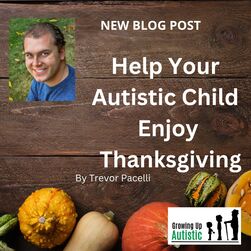 By Trevor Pacelli Thanksgiving, like most holidays, is prone to overwhelm kids on the autism spectrum. It’s a day of having lots of guests in the house or going to see guests whose rules are different from back home. The kids are also expected to be present and active the whole time around family friends and relatives. Along with the constant socialization and change in routine, there are also lots of new, unfamiliar foods. To help your autistic child enjoy Thanksgiving despite the overwhelming amount of newness, here are some ideas to help: Schedule- Growing up, I always woke up at the same time, ate at the same times, and went to bed at the same time. I found comfort in routine and predictability. That’s why I needed to know what was going to happen, and when, to enjoy holiday celebrations. Even if I had to stay awake later and eat dinner later, being given an expectation of the day’s events and times helped me enjoy the day. You can do the same with your autistic child by giving them a schedule ahead of time of what Thanksgiving will look like. For example, 2:30 is when guests are going to arrive, 4:00 is dinner, 6:00 is dessert, 7:00 is the family game, and 9:30 is when the guests leave. Socializing- With my Thanksgivings, the kids often went and did their own thing separate from the grownups. I usually had minimal problems with this scenario since I often already knew the other kids fairly well. However, this wasn’t the case when we visited my dad’s relatives in Arizona, with many cousins I couldn’t name until I was in college. The problem was that I never got a proper introduction to who everyone was or how I was related to them. Thus, my time spent with them, not just for Thanksgiving but any celebratory occasion, was uncomfortable for me. So, it’s helpful to give your autistic child proper introductions to the kids of the host family so they’ll feel more comfortable and prepared. Food- Across my childhood, I rarely ate anything besides grilled cheese, French fries, macaroni and cheese, and most sweets. No matter how much my parents tried to encourage me to try new foods, I just hated the thought of eating anything new—even cheeseburgers were unappetizing until I was nine. Many autistic kids are hypersensitive to specific tastes, smells, and textures, which can make them even pickier eaters than other kids their age. To help your autistic child eat the given meal on Thanksgiving, give them the chance to taste something like turkey and other dishes a few days before. If they end up liking the food, great! You broke new ground! If not, don’t press on them to eat the unfamiliar foods on Thanksgiving. Let them eat the foods offered that they do enjoy eating and don’t worry if it’s just dinner rolls and cranberries. Bedtime- First of all, it’s a good thing when your autistic child wants to keep their routine of going to sleep the same time each night, for sleep experts agree that a consistent sleep cycle is crucial. So don’t think that your child is being whiny for wanting to go to bed at 9:00 like always when the party’s expected to keep going for another hour and a half. If you’re the one hosting, simply give your child permission to put themselves to bed at their scheduled time, or step away and help them. But if you’re at someone else’s house, knowing the schedule mentioned earlier comes in handy. Yet if they’re really exhausted and can’t carry on any longer, simply allow them some alone time. Just like how introverts need time to themselves to recharge, anyone with autism would need the same to not get overwhelmed. Thankfulness- It’s often tradition for people around the Thanksgiving table to share what they’re thankful for. The most common answers are usually, “I’m thankful for my parents” or “I’m thankful for our health and safety.” Yet don’t be surprised when it’s the autistic kid’s turn to share what they’re thankful for, and they say, “I’m thankful for SpongeBob SquarePants!” Most people with autism have a rather low priority for human relationships, especially since they don’t have the tendency to relate to other humans very easily. They find great comfort around fictional characters. If a child wants to say they’re thankful for Spider-Man or Bluey, don’t reprimand them or feel offended. It doesn’t mean they’re not grateful for you or their siblings. But more importantly, don’t force them to say they’re thankful for a person, because if pressured into saying this, they won’t mean it. Ultimately, the main takeaway is that no matter what your circumstances are like with your autistic child, don’t focus on trying to cover up the inconveniences. Instead, help your child draw attention to whatever excites them. Maybe they would be excited for the yummy cookies? Or maybe the games? Or maybe the movie you’ll all watch together? Focusing instead on what is fun for your child rather than a hindrance will give everyone in your family a chance to enjoy time as a community, forming fond memories that’ll last for years to come. Trevor Pacelli is a young adult author on the autism spectrum. He is the author of Six-Word Lessons on Growing Up Autistic, What Movies Can Teach Us About Disabilities, and other books.  Image via Freepik Image via Freepik Guest blog by Jennifer MacGregor Caring for a child with a disability requires unswerving dedication plus emotional and physical resilience. The unique challenges make parental self-care an overlooked priority. Here are some strategies to help parents cope:
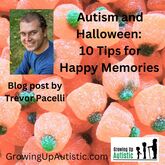 By Trevor Pacelli So many people of all ages love Halloween, yet this time of year could also really upset someone on the autism spectrum. Therefore, here are some essential tips that can help anyone with or without autism enjoy this spooky time of year despite the limitations: 1. Prepare for the Scares Kids with autism have many hyper-sensitivities, and since Halloween is the season of sending chills, an autistic child could turn queasier than usual at the sight of blood, even fake blood. For instance, they might strongly hesitate to step inside a costume shop full of ghoulish lawn decorations. It’s important that a parent is there to be on the lookout for such distressing decorations and guide their kid’s eyes the other way whenever possible. 2. Jack-o-Lanterns and Scarecrows are Fun Sensory-Friendly Activities! While growing up, my sister and I bought our own pumpkins, drew faces on them, and our dad used a small saw to cut the lines for the faces. Then we put our jack-o-lanterns on the porch right next to the scarecrow we made from clothes full of crumbled-up newspaper with a fabric sheet wrapped around a soccer ball for the head. The saw can be awfully loud, but the child doesn’t have to be in the room while it’s on, and simply cutting into the pumpkin with a knife will get the job done too! 3. Special Interests Can Inspire Costume Ideas I have fond childhood memories of preparing my Halloween costumes with my mom. One year, she helped me make a costume based on a superhero character I created. Another year, she bought used clothes to cut up, paint over, and distress so I could dress up as Two-Face from Batman. These were fun projects for my mom and me to bond over, and they were inspired directly by whatever I was interested in at the time. 4. My Costume Hurts! Autistic people often are hypersensitive to certain clothing materials or smells, and that can include the distinct latex odor of a rubber mask. These costumes would be no fun for kids on the spectrum to wear and at times can even be painful. So, parents should think twice about encouraging their child to wear a certain costume just because it would look “so cute.” If the costume is causing them pain, then the Halloween season will be no fun for them at all. 5. Trick-or-Treating Together Most kids go trick-or-treating in groups every year, yet a child with autism, who often struggles to make friends, might have nobody to spend the evening with besides Mom, Dad, or an older sibling. This can make Halloween a lonely time of year, and it can break the hearts of parents to watch their child go trick-or-treating alone. One solution might be to arrange a meetup with family friends who have kids around the same age as the autistic child. 6. Overstimulation Around the Houses A kid with autism could hate houses with flashing light patterns or loud sound effects, which could make them even less likely to say, “trick or treat.” A quick way for the autistic child’s parents to explain why their kid won’t make eye contact is to show the questioning parents a small card that explains the kid’s sensitivities. However, it’s not advisable to give that child an “autism” badge or make them carry a blue jack-o-lantern bucket because that could lead to bullying. 7. Will Stranger Danger be a Problem? Probably not. The kids will be surrounded by plenty of other adults also chaperoning their little trick-or-treaters, and most parents in neighborhoods are friendly. Also, the stories of kids being killed or injured by razor blades hidden in candy are mostly just myths. Any accounts of Halloween candy being tampered with are few, and hardly anything to stress about. 8. Sometimes the Child Would Rather Stay Home I personally loved dressing up and getting free candy, but when my work on the streets was done for the night, my mom handed the door-answering duties over to me. It was more fun for me to see the costumes worn by the other kids, some of whom were from my class. This could be more comfortable for a kid with autism—no costume to wear, no flashy lawn decorations to look at, no cold weather to walk through, and the only eye contact that needs to be made is with other kids. 9. Know the Limits of Candy I struggled in the past with just how much food was too much since I lacked the judgment of portion sizes that others had. Kids on the autism spectrum could be the same way, where they don’t know how much candy in one sitting is too much. While any kid would want to eat as much as they can in one sitting, they usually know by instinct when to stop. Yet by the time an autistic child has registered that they’ve had enough candy, they’ve already eaten twenty candy bars. 10. The Child Must Know When to Stop Trick-or-Treating I was twelve when I last trick-or-treated, which I’d say is an appropriate age to stop. While there are many things in life you shouldn’t feel ashamed of never outgrowing, trick-or-treating isn’t one of them. Autistic kids can lack common sense about whether they’re too old to enjoy something. In my experience, I was still watching preschooler TV shows when I was in third grade, and needed to be told what those shows’ target audience was. I hope these tips help your child with autism create as many happy memories of Halloween and trick-or-treating as I have. Trevor is an adult with autism and is the author of Six-Word Lessons on Growing Up Autistic and What Movies Can Teach Us About Disabilities. |
Inspiration for Life with AutismThis blog has a variety of articles about people living life with autism, and topics and ideas that can help in the journey. Guest bloggers are welcome. Inspired by Trevor, a young adult film critic, photographer and college graduate on the autism spectrum. Categories
All
Archives
July 2024
|
Proudly powered by Weebly
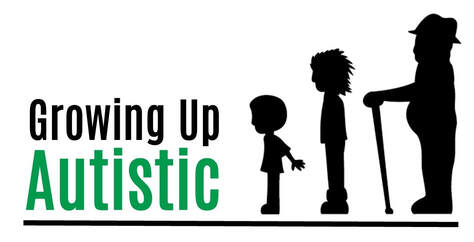

 RSS Feed
RSS Feed